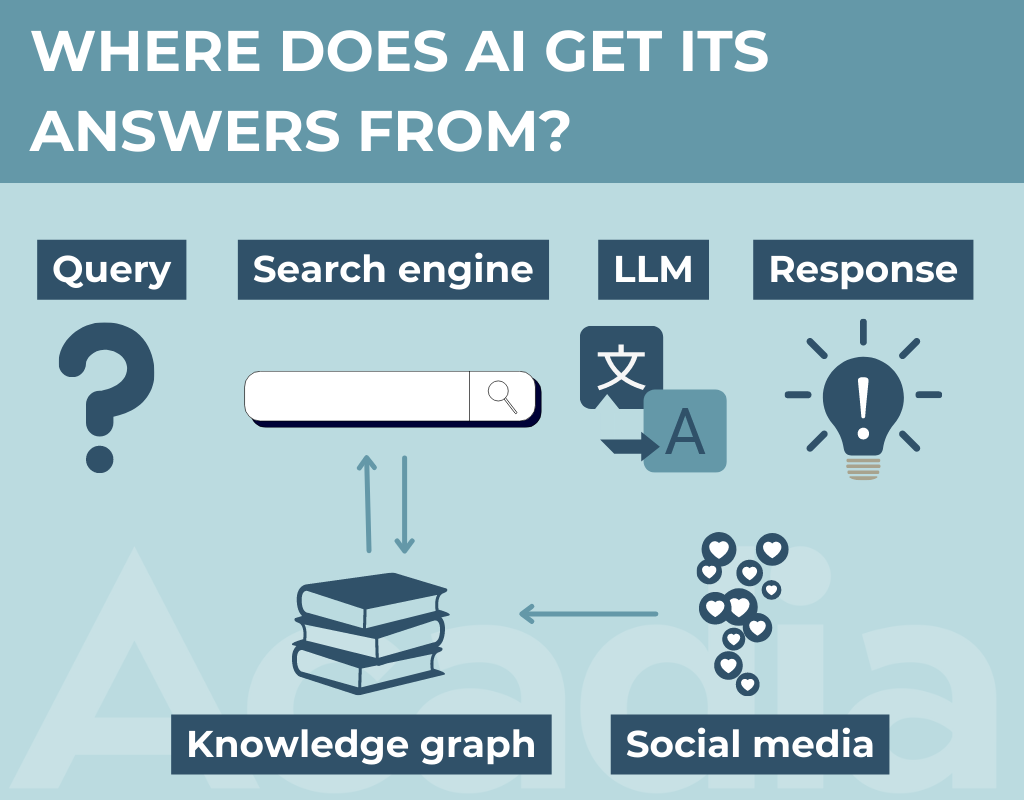It’s our view here at Acadia that AI is not just a way to improve productivity for a marketer, it will actually become a marketing channel in and of itself.
Let me explain.
Many users are now using conversational AI models like chatGPT, Bard, and Bing (which is built on chatGPT) to do research, rather than doing a “traditional” search on Google or Bing. In fact - “chatGPT” is an increasingly common answer when we ask prospective clients how they found out about Acadia!
So marketers must start considering how their products and services are indexed and portrayed in conversational AI results - just like they have for decades now with SEO.
In this post I’ll share how three fundamentals of ‘traditional’ SEO can be applied to a future where more discovery and consideration will occur by chatting with an AI.
But before we jump in, let’s do a quick review of where AI models actually source their information from.

Search Engine.
Search engines function as librarians or arbiters, prioritizing and weighting information through algorithms. This is the “front end” of the AI - the chatbot interface of ChatGPT, for example.
Knowledge Graphs.
Knowledge graphs provide structured knowledge and understand relationships between different things. This is the source of all information that is searched by the search engine. We share below the known and speculated sources of information that various AI tools are referencing.
We believe that social media may not be directly indexed in AI knowledge graphs, but it can influence other conversations and content on the web.
Large Language Models.
The LLM is the interpreter of the system. It interprets and frames information in the context of the query's intent, helping you understand the right answer to your question. In essence, LLMs generate highly tailored, human-like text, creating personalized content on various digital platforms. LLMs are also expected to be updated over time - both as language evolves and the AI learns how to better interpret questions and provide relevant responses.
It is the knowledge graph that we as SEOs are interested in influencing. So let’s now dive into three ways to do that.
The Importance of Reputation Management in an AI world
AI is constantly scouring various forms of web content, ranging from mainstream media publications to public forums. It is no secret that brands with a strong digital presence tend to fare well in the realm of AI. To ensure that your brand is on the winning side of AI interactions, it is crucial to focus on clear, relevant, and updated content not only across the online platforms your company owns (your website, your social media accounts) - but on review sites, forums, editorial content, and other user-generated content.
Some of the source material that AI is scouring to figure out your brand’s “place in the world” may be surprising. For example it seems like chatGPT relies heavily on Yelp reviews when considering which local businesses to recommend (restaurants, hotels, car washes, etc).
You may have long forgotten Yelp as a user and prefer to use Google Maps. But Google, with its new Bard AI, is ultimately a competitor to chatGPT. So it makes sense that chatGPT is sourcing information from a less popular platform.
Reputation plays a crucial role in determining how AI perceives your brand. Utilize online business profiles that welcome and encourage customer reviews. Pay close attention to both positive and negative feedback and take corrective action when necessary. Consumers value trust and are more likely to do business with reputable companies. Moreover, AI systems heavily rely on reviews, making it essential for businesses to actively manage their reputation through the lens of AI queries.
The important action to take here is an audit of which sources the various AI models are using to make recommendations within your competitor set.
You may be in for an unwelcome surprise. Reputation management takes time, so its best to get a jump on improving your business’ reputation now.
This audit is part of our Indexing AI checklist - a comprehensive process to audit and prepare for a future where AI models are one of your marketing channels. Get the white paper & checklist here.
AI Models Favor Authoritative Media Sources
Another mainstay of traditional PR is securing backlinks from reputable websites.
This is likely to continue to be an important element of ensuring your brand is represented in the best way possible within recommendations from conversational AI queries.
Articles and reviews from reputable media outlets are likely to rank high in the consideration set of data and information that AI search engines are crawling.
Consider the following query as an example, “Provide recommendations for hotels in Melides, Portugal. Prioritize newly built, boutique hotels that are stylish, chic and Instagrammable.”
Chances are, AI models will weight an article like this one from Conde Nast Traveller pretty highly in its selection. The intent of the query suggests that the user won’t be satisfied with DoubleTree with good ratings on Yelp. The nature of the query will shape which information sources are chosen and shared back with the user.

This all means that brands with a solid PR strategy are already on the right path. Brands who aren’t yet on board, should consider adding this strategy to their marketing arsenal.
Technical optimization on your website facilitates indexing by AI models
The seed of traditional SEO lies in providing high-quality content that is valuable and engaging to the user. AI learns from the information it is given, so investing in quality content and timely updates is key. By speaking the language your customers use to search for your brand and addressing their specific needs, you can greatly improve your chances of your products and services being represented correctly in AI-driven interactions.
Your website serves as a gateway for AI models to crawl and index your content. To optimize this process, it is important to have an authoritative and robust online presence. Ensure that your website is fast, mobile-friendly, and utilizes structured data to help AI systems effectively understand your content. This technology serves as the fertilizer for your SEO efforts.
In summary
In conclusion, adapting your marketing practices to cater to AI is crucial in the digital age. Focus on high-quality content, optimize your website for AI crawling, protect your brand's online reputation, and engage in PR activities to enhance it. By doing so, you can position your brand as a trusted source and increase your chances of being included in AI query responses. Embrace AI as an opportunity to strengthen your online presence and stay ahead in today's competitive landscape.
Want to go deeper on this topic?
We got you! We went REAL DEEP in our white paper, “Planting the seeds: how to get your brand indexed in conversational AI results”
